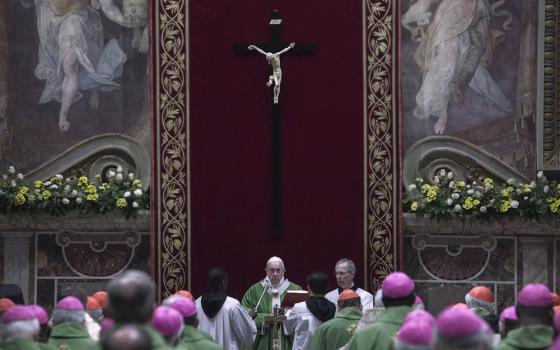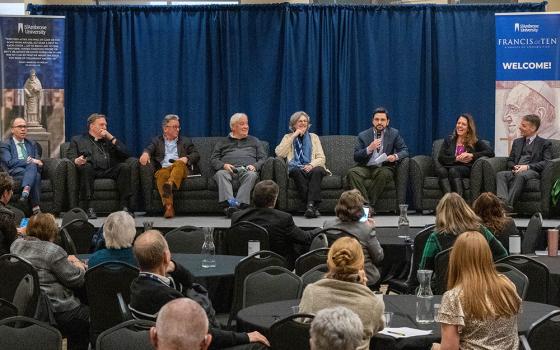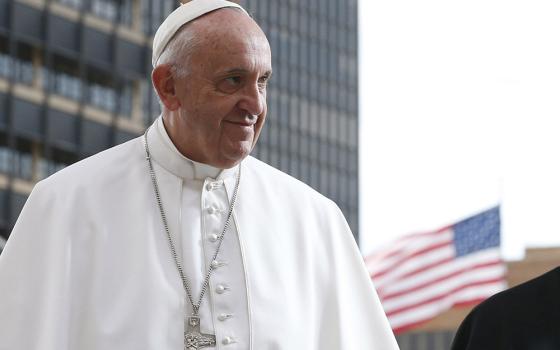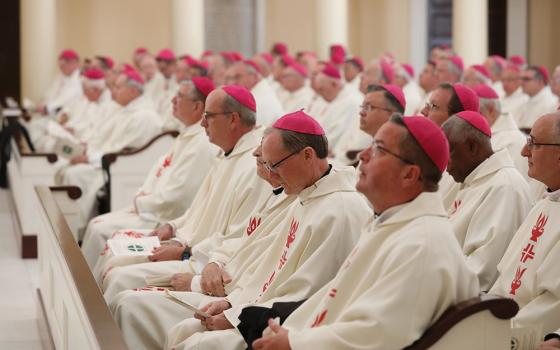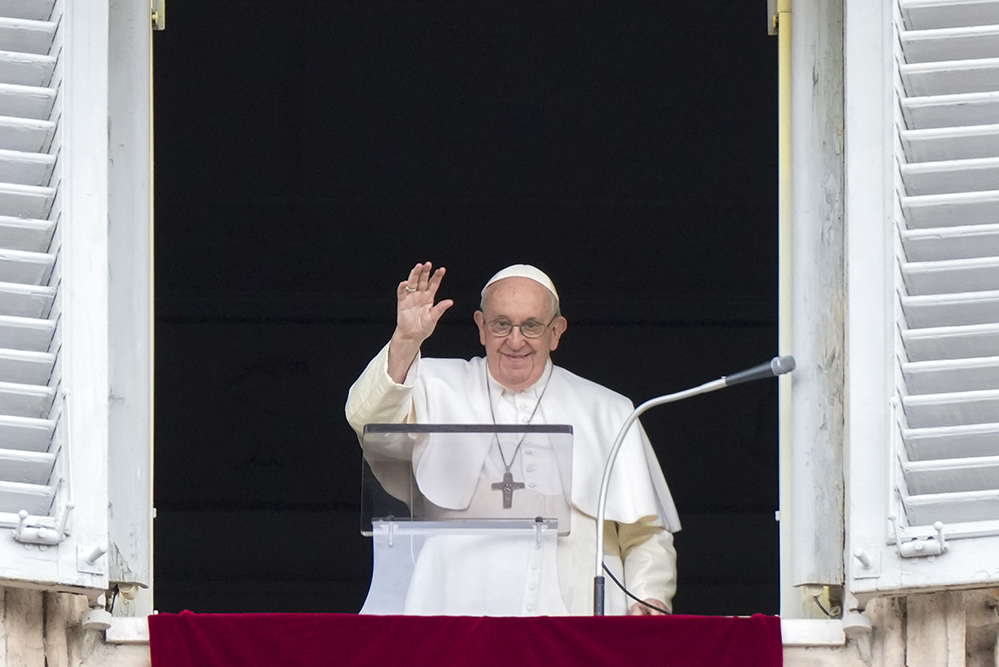
Pope Francis delivers his blessing as he recites the Angelus noon prayer from the window of his studio overlooking St. Peter's Square at the Vatican Feb. 26. (AP/Andrew Medichini)
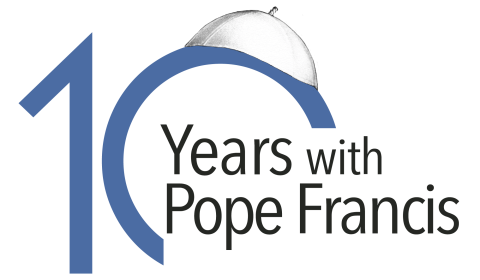
As we approach the 10th anniversary of the election of Pope Francis, his role as pastor shines through first and foremost, followed by his understanding of his role as teacher of the faith, specifically re-centering the core proclamation of God's mercy. Both, in turn, shape the third aspect of this pontificate that warrants attention: Francis the reformer.
To understand Francis as a reformer, it is first necessary to clean up a misunderstanding about his predecessor, Pope Benedict XVI. Some commentators and bishops have invoked Benedict's 2005 address to the Curia to claim the pope demanded a "hermeneutic of continuity" between the pre-Vatican II and post-Vatican II church. In fact, while Benedict deprecated a "hermeneutic of rupture," he called for a "hermeneutic of reform, of renewal in the continuity of the one subject-Church which the Lord has given to us."
This is no more than what Vatican II achieved in its careful, self-conscious balancing of the aggiornamento (bringing up to date) impulse St. Pope John XXIII imparted to the council and the ressourcement (return to the sources) theology that made the council possible and gave the conciliar documents their most basic shape and contours.
Renewal combines those two pillars, and all of Francis' efforts at reform are marked with this stamp of aggiornamento and ressourcement as called for by Vatican II.
Why, then, all the fuss about Francis being some kind of revolutionary?
In large part, this is the most Christian of stories. "It is a striking feature of the Gospels that although the common people accepted Jesus enthusiastically, he raised alarms among those who saw themselves as guardians of the tradition and the truth," wrote Austen Ivereigh in his 2019 book, Wounded Shepherd: Pope Francis and His Struggle to Convert the Catholic Church. "The hostility to Francis from traditionalist and conservative groups in the Church that erupted during the Jubilee of Mercy of 2016 offered some striking parallels."
When Francis says he wants to get back to basics, he doesn't mean the catechism; he means the Gospel. This is the key reform underlying any and all particular reforms.
As discussed last week, Francis' effort to re-center mercy at the heart of Christian teaching, as seen in his Jubilee of Mercy and countless other ways, drives some people crazy. The venom spewed at the pope was astonishing. The "elder son" syndrome found in the parable of the prodigal, full of self-righteous indignation, has been on full display these past 10 years among many of Francis' critics.
Secondly, Francis' understanding of his role as pastor has shaped all the reforms he has enacted, and further angered his critics. In synods and in sermons, the pope has insisted that pastors get close to the people and accompany them. His early invocation of the image of the church as a field hospital showed his attentiveness to the wounds the people of God carried.
Millions of people, tired of being judged by prelates from on high, sighed a sense of relief when Francis famously said, "Who am I to judge?" Only the haughty and the proud were outraged.
In a recent address at Sacred Heart University, Archbishop Christophe Pierre, the apostolic nuncio, cited the philosopher Henri Bergson's Creative Evolution in explaining how the Holy Father relies on his pastoral intuitions as much, or more, than theological reasoning:
We see that the intellect, so skillful in dealing with the inert, is awkward the moment it touches the living. Whether it wants to treat the life of the body or the life of the mind, it proceeds with the rigor, the stiffness and the brutality of an instrument not designed for such use. [...] Intuition, on the contrary, is molded on the very form of life. While intelligence treats everything mechanically, intuition proceeds, so to speak, organically.
"Intuition, however, can only function in a specific context, which is the close proximity with the reality that we want to explore," the nuncio added. "Intuition requires a movement and an engagement that bridges the gap between the observer and the observed. In fact, its posture is the opposite of that of the scientific method, which calls for a certain distancing between the scientist and the object of study."
I am reluctant to endorse any disparagement of the intellect at a time when the very idea of truth itself is under attack, but Bergson and the nuncio are on to something. At the very least, conceiving the teachings of the church in abstract terms, as if pastoral solicitude consisted in handing people a copy of the catechism, has proven a disaster. When Francis says he wants to get back to basics, he doesn't mean the catechism; he means the Gospel. This is the key reform underlying any and all particular reforms.
Advertisement
In making the synods more genuinely dialogical events, in publishing synopses of his morning sermons, in his annual scolding of clericalism during his Christmas addresses to the Roman Curia, all evidenced the kind of reforms Francis wants to achieve.
This was especially clear in another signature reform, that of the curia. In the book A Pope Francis Lexicon, edited by my NCR colleague Joshua McElwee and CNS Rome bureau chief Cindy Wooden, the chapter on reform was penned by Cardinal Óscar Rodríguez Maradiaga, whom the pope tapped to chair the Council of Cardinals, the group tasked with helping reform the Roman Curia. The cardinal writes:
In [the pope's] perspective, it should be noted that the reform will be effective only if it is done with "renewed" men and women and not simply with "new" men and women. It isn't enough to change personnel but members of the Curia must renew themselves spiritually, personally, and professionally. ... In reality, a "continuing formation" will not suffice; "a continuing conversion and purification" is needed above all: "without a change of mentality, efforts at practical improvement will be in vain" (speech to Roman Curia, December 22, 2016).
The juridical reform of the Curia was accomplished with the publication of the much-delayed apostolic constitution Praedicate Evangelium, which finally came out last year. It planted many seeds and we are all waiting to see how, and if, they will blossom.
The seeds of declericalization may constitute the largest hurdle, but the need to conform the Curia to the mission of evangelization, and the closely linked, inseparable mission of witnessing to the new communion made possible by the incarnation of God made man, is a close second. The ecclesiological and the evangelical are intertwined, a theme that has characterized all post-conciliar pontificates.
Ecclesial reform contains elements of continuity and discontinuity because the nature of the church requires it. On the one hand, all of our ecclesial life is rooted in the revelation of Jesus Christ. On the other, the church Christ founded is a living thing, and, as St. John Henry Newman said, "In a higher world it is otherwise, but here below to live is to change, and to be perfect is to have changed often."
For some, on both left and right, Francis' reforms have not gone far enough. "From the beginning of Francis's papacy, there's been a misperception that his constant criticism of clerical elites equates to a liberal ecclesiology paving the way for more democratic Church governance," writes Massimo Faggioli at Commonweal. "This misunderstanding is evident in some of the critical reactions in Rome to the ongoing synodal process — even though it's far too early to tell what the result of the process will be, and what Francis and the bishops will make of it."
Francis has said countless times that a synod is not a parliament. He is careful about managing expectations, something I wish more bishops would do.
This synodal process is, as it were, the apotheosis of Francis' pontificate. It brings together the three themes discussed so far: his role as pastor, teacher and reformer. And I shall focus on this synodal process in my final look at Francis' papacy at the 10-year mark next week.




